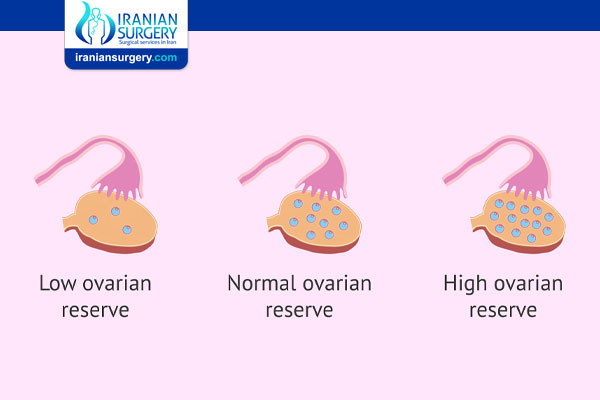Ovarian Reserve
Ovarian Reserve
A woman’s ability to get pregnant normally decreases as she gets older. In later life, women have fewer eggs, egg quality goes down, and eggs have more abnormalities in their chromosomes (genetic material). All these factors together mean that older women have lower pregnancy rates and higher miscarriage rates.
The ability to have a baby decreases in all women as they get older, but the exact age when a woman can no longer conceive varies from woman to woman. In some women, this happens at a younger age than would normally be expected. About one third of couples will have problems getting pregnant when the female partner is age 35 or older. There are several tests that can help show a woman’s fertility potential, also called ovarian reserve.
Blood tests: FSH, Estradiol, and AMH
One common way to test ovarian reserve is by measuring hormone blood levels. Follicle-stimulating hormone (FSH) and estradiol are checked at the beginning of the menstrual cycle. This is usually done on cycle day 3, but it can be drawn from day 1 to 5. These hormone levels can show important information about how the ovaries and pituitary gland are working together.
The pituitary gland makes FSH to make a follicle grow. A follicle is a small cyst that contains the egg. Usually, FSH levels are lowest in the beginning of the menstrual cycle and then go up, causing a follicle to grow and the egg to mature. As this happens, the follicle releases estradiol. In turn, these higher levels of estradiol tell the pituitary gland to make less FSH. If the egg and follicle start to grow too early because FSH is already rising, estradiol is produced faster. If development is too fast, the egg does not mature properly.
In general, women whose cycle day-3 levels of FSH and/or estradiol are high are less likely to have a baby after either ovulation induction or in vitro fertilization (IVF) compared with other women of the same age.
Antimüllerian hormone (AMH) is another test of ovarian reserve. It is made in the follicle and is related to the number of eggs. AMH levels can be drawn at any time during the menstrual cycle.
You should know that laboratory procedures and “normal” levels vary from lab to lab. It can be difficult to compare results from one laboratory to another.
Clomiphene Citrate Challenge Test
This test involves taking a medicine called clomiphene citrate to see how the ovaries respond. It is given early in the menstrual cycle. Blood levels of FSH and estradiol are measured before and FSH is measured after clomiphene citrate is given. Women have lower pregnancy rates with both ovulation induction therapy and IVF if their FSH levels are high at either time.
Antral follicle count
A transvaginal ultrasound may be done in the early part of the menstrual cycle to count the number of small (2mm-10mm) follicles in the ovary. These are called antral follicles, and are where eggs develop. The number of antral follicles can tell us how many eggs are available and about the woman’s response to gonadotropin medicines. This test is more accurate when it is done by a health-care provider who is experienced in working with fertility evaluations.
Response to Gonadotropins
Gonadotropins are hormone medications (FSH alone or FSH with luteinizing hormone) that are given to stimulate the ovary to grow multiple eggs at once. They are given by injection to prepare a woman for fertility therapies.
Higher doses of these medicines are usually needed to help with egg development as a woman gets older. Women who require large, or larger than expected, amounts of gonadotropins generally get pregnant less often with both ovulation induction therapy and IVF.
What these tests tell us
These tests try to predict a woman’s response to fertility treatment and how likely she is to get pregnant compared to other women of the same age. Abnormal ovarian reserve test results suggest that fertility potential has declined but they do not tell who will or who will not conceive. Some younger women with normal test results have difficulty conceiving. Results may vary from cycle to cycle; however, any one abnormal test generally shows that fertility potential has decreased.
The chance of getting pregnant is primarily related to the quality of the eggs. Women over the age of 35 with abnormal test results who have not had successful treatment have a lower chance of conceiving. These women may be candidates to use eggs or embryos from a donor. Even with a normal ovarian reserve test, older women may have difficulty conceiving.
No single test of ovarian reserve can predict a woman’s ability to get pregnant. These tests are often used to develop a treatment plan, including the need for donor eggs or embryos.
Source:
. https://www.reproductivefacts.org/news-and-publications/patient-fact-sheets-and-booklets/documents/fact-sheets-and-info-booklets/ovarian-reserve/


